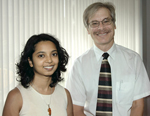Can broccoli save us from osteoarthritis?
BU researchers study influence of vitamin K

Researchers at the School of Medicine have some reason to believe that more trips to the produce aisle could mean fewer trips to the medicine cabinet for millions suffering from osteoarthritis, the most common form of arthritis. Now, with help from a $200,000 grant from the Arthritis Foundation, Tuhina Neogi, an instructor of medicine, and David Felson, a professor of medicine and epidemiology, hope to find out for sure. The two scientists are investigating whether vitamin K, found in green leafy vegetables and broccoli, can slow or help prevent the disease.
Osteoarthritis, which affects nearly 21 million Americans, occurs when the cartilage that cushions bone joints deteriorates from years of wear, leading to pain, stiffness, inflammation, and swelling. The disease most often affects the hands, knees, and hips, and is a leading cause of disability for seniors.
“For some people, these symptoms remain mild,” explains Neogi. “For others, it can progress to the point where they need their joints replaced.”
The prevalence of osteoarthritis is greater among older and overweight populations, and as America’s 77 million baby boomers age and obesity rates continue to increase, Debbie McCoy, vice president of research for the Arthritis Foundation, believes the disease will “grow to epidemic proportions.”
There is no cure for osteoarthritis. Current treatments focus on alleviating the pain and other symptoms. Finding ways of slowing or preventing the disease is a major focus of research within the University’s Arthritis Center, where scientists are also studying other rheumatic diseases, such as rheumatoid arthritis, the vascular disease scleroderma, and carpal tunnel syndrome. To support such efforts, the Arthritis Foundation has given Boston University nearly $3 million in research grants over the past seven years.
“The arthritis research that’s going on at Boston University is some of the most exciting prevention research we have,” says McCoy.
Neogi and Felson hypothesize that vitamin K, which is known to help proteins that work to clot blood, might also be important for proteins that build and strengthen bone and cartilage. “[Vitamin K] may make cartilage hardier so that it better withstands wear and tear,” says Felson. “It may allow the bone to respond in a more healthy fashion to the wearing away of cartilage. And it may act as an anti-inflammatory, reducing the inflammation of joint linings that causes pain.”
Neogi and Felson were encouraged by the results of an earlier, observational study they conducted, using X-rays and vitamin K assessments from a group of participants in the Framingham Heart Study, the ongoing National Institutes of Health epidemiological study begun in 1948 and overseen by BU since 1971. Participants with the highest levels of vitamin K in their blood exhibited 30 to 40 percent less osteoarthritis than participants in the lowest quartile of vitamin K levels.
Nevertheless, the researchers understood that high levels of vitamin K could simply be indicative of a healthier lifestyle, one that reduces such other arthritis risk factors as obesity. A clinical trial was needed to establish a definitive link between the osteoarthritis and a particular nutrient.
Neogi and Felson partnered with Sarah Booth, an associate professor of nutrition at Tufts University, who has been investigating possible links between vitamin K, bone loss, and vascular calcification (a marker of heart disease) in a double-blind clinical trial of more than 450 people over age 60 that began in 2002.
Half the study participants received multivitamins with a large dose of vitamin K, while the other half took multivitamins that lacked vitamin K. The Arthritis Foundation grant will enable Neogi and Felson to obtain X-rays and to distribute joint-symptom questionnaires to participants during their final study visits, which will conclude by this October. Preliminary results could be available by the middle of 2007.
If a link between vitamin K and osteoarthritis is found, millions of Americans would have an easy way to help maintain their mobility into old age — eating more green leafy vegetables (which Americans typically don’t eat enough of) or taking a vitamin K supplement, “much like people now take calcium and vitamin D for osteoporosis,” says Neogi.
“Everyone wants to know if there’s something they can eat that can help with arthritis, and now we might be in the position of being able to say yes,” says Felson. “It’s a great opportunity, because it’s simple and it might have a tremendous public health and clinical impact.”
John Klippel, president and CEO of the Arthritis Foundation, agrees. “I think [the researchers at Boston University] have really been pioneers in approaching osteoarthritis from an epidemiological standpoint,” he says. “The fact that this disease is so common suggests that there could be common things that can influence it.”